

Financement des partis politiques au Canada. Un article de Wikipédia, l'encyclopédie libre.
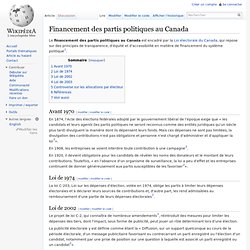
Le financement des partis politiques au Canada est encadré par la Loi électorale du Canada, qui repose sur des principes de transparence, d'équité et d'accessibilité en matière de financement du système politique[1]. Avant 1970[modifier | modifier le code] En 1874, l'Acte des élections fédérales adopté par le gouvernement libéral de l'époque exige que « les candidats et leurs agents (les partis politiques ne seront reconnus comme des entités juridiques qu'un siècle plus tard) divulguent la manière dont ils dépensent leurs fonds.
Cour suprême du Canada - Décisions. Harper c.
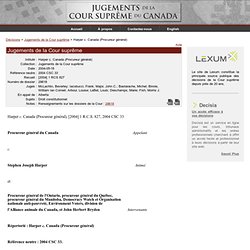
Buckley v. Valeo. Opinion Per Curiam Opinion These appeals present constitutional challenges to the key provisions of the Federal Election Campaign Act of 1971 (Act), and related provisions of the Internal Revenue Code of 1954, all as amended in 1974.
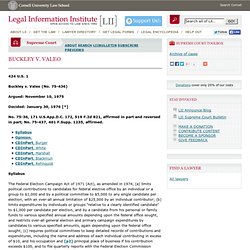
scholarship.law.missouri.edu/cgi/viewcontent.cgi?article=3358&context=mlr. Le pétrole, le président et les voyous. Hollywood refuserait un tel scénario pour invraisemblance.
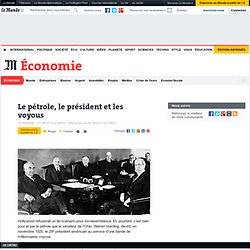
Campaign Finance Reform In Congress Moves Forward With Little Hope For Passage. WASHINGTON -- The 2012 election was the most expensive in history, with a pricetag as high as $6 billion. This staggering amount brought with it many broken barriers: the first $1 billion presidential candidate, the first $70 million Senate campaign, the first $20 million House candidate, and a record $1 billion spent by independent groups, which failed to disclose a record amount. These broken records, like extreme weather in a changing climate, are just signs of the rising tide of money in the nation's political system.
For even the non-record breaking political candidates, elections are getting more expensive and less transparent. As a result, candidates spend more time raising money from big-dollar donors and fearing the ire of billionaires, who can freely spend secret money to defeat them. MCCONNELL V. FEDERAL ELECTION COMM’N. McCONNELL, UNITED STATES SENATOR, et al. v.
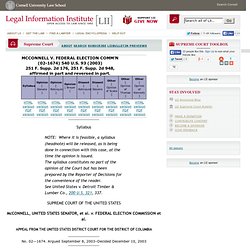
FEDERAL ELECTION COMMISSION et al. No. 02—1674. The Bipartisan Campaign Reform Act of 2002 (BCRA), which amended the Federal Election Campaign Act of 1971 (FECA), the Communications Act of 1934, and other portions of the United States Code, is the most recent of nearly a century of federal enactments designed “to purge national politics of what [is] conceived to be the pernicious influence of ‘big money’ campaign contributions.” United States v. Automobile Workers, 352 U.S. 567, 572. With regard to the first development, prior to BCRA, FECA’s disclosure requirements and source and amount limitations extended only to so-called “hard money” contributions made for the purpose of influencing an election for federal office.
Held: The judgment is affirmed in part and reversed in part. L'argent obscur de la campagne américaine. Imaginez la Macif, la CGT, le Medef et la milliardaire Liliane Bettencourt signant des chèques de plusieurs millions d'euros pour soutenir des candidats à la présidentielle française et vous aurez tout compris aux lois de financement électoral aux Etats-Unis —ou plutôt, à ce qu'il en reste depuis une décision de la Cour suprême de janvier 2010.
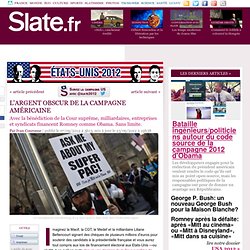
Les chèques peuvent être de n'importe quelle source, n'importe quel montant et sont souvent secrets. Et ce n'est pas une façon de parler: le milliardaire américain Sheldon Adelson, patron d'un groupe de casinos du Nevada, et son épouse ont donné 20 millions de dollars pour soutenir le candidat à la primaire républicaine Newt Gingrich, dont la campagne était fauchée. Campaign finance: The hands that prod, the wallets that feed. From Buckley to Citizens United (Part One of Two) « Nahmod Law. This is the first of two posts on the Supreme Court‘s controversial First Amendment corporate expenditure decision dealing with campaign financing of federal elections, Citizens United v.
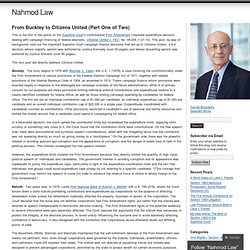
FEC, No. 08-205 (1-21-10). This post, by way of background, sets out the important Supreme Court campaign finance decisions that led up to Citizens United, a 5-4 decision whose majority opinion was authored by Justice Kennedy (over 50 pages) and whose dissenting opinion was authored by Justice Stevens (over 80 pages). The next post will directly address Citizens United. Buckley. The story begins in 1976 with Buckley v. In a bifurcated decision, the Court upheld the contribution limits but invalidated the expenditure limits. However, the expenditure limits violated the First Amendment because they directly limited the quantity of high value political speech of individuals and candidates.
Bellotti. Violations of Election Laws - Elections. The United States Constitution enacts penal laws to preserve the purity of election process.
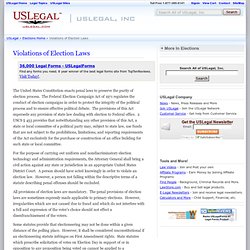
The Federal Election Campaign Act of 1971 regulates the conduct of election campaigns in order to protect the integrity of the political process and to ensure effective political debate. The provisions of this Act supersede any provision of state law dealing with election to Federal office. 2 USCS § 453 provides that notwithstanding any other provision of this Act, a state or local committee of a political party may, subject to state law, use funds that are not subject to the prohibitions, limitations, and reporting requirements of the Act exclusively for the purchase or construction of an office building for such state or local committee.
For the purpose of carrying out uniform and nondiscriminatory election technology and administration requirements, the Attorney General shall bring a civil action against any state or jurisdiction in an appropriate United States District Court. 201 - Bribery of public officials and witnesses. Glossary. Campaign Committee: A fund-raising committee set up by a candidate to finance a campaign for state or federal office.
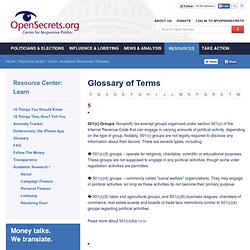
All campaign committees file regular campaign finance reports -- usually once a quarter -- with the Federal Election Commission that detail their donors and expenditures. Candidate-to-Candidate Giving: Contributions made by members of Congress whose seats are considered safe to candidates facing difficult elections. Outside Spending. Here at OpenSecrets.org, we provide breakdowns of data reported by outside spending groups to the Federal Election Commission, with a separate section devoted to data we've dug up on contributions to politically active nonprofits -- over $780 million and counting -- which aren't required to publicly report their donors.
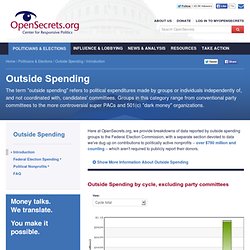
The outside spending landscape is in constant flux. In 2002, Congress passed the Bipartisan Campaign Reform Act -- commonly referred to as McCain-Feingold -- which set limits on "soft money" contributions and banned special interest groups from making issue ads. Media Project » Blog Archive » Presidential Ads 70 Percent Negative in 2012, Up from 9 Percent in 2008. Media Project » Blog Archive » Presidential Ad War Tops 1M Airings.
Pro-Romney Ads Cut into Obama Advantage in Last Week of Oct; Obama campaign outspends Romney campaign 2.6:1 on ads in the general election period; Republican outside groups make up the difference for Romney (MIDDLETOWN, CT) Nov. 2, 2012 – As the 2012 campaign comes to a close, the number of ads aired in the presidential general election passed the one million mark last week. As of October 29, the two candidates, their party committees, and supporting interest groups had sponsored 1,015,615 ads since June 1, a 39.1% increase over 2008 (730,041) and a 41% increase over 2004 (720,064), during the same period. C.N.C.C.F.P. - Commission nationale des comptes de campagne et des financements politiques - Accueil. Décision du 11 avril 2011 relative à la présentation des comptes de campagne en vue de l'élection présidentielle.